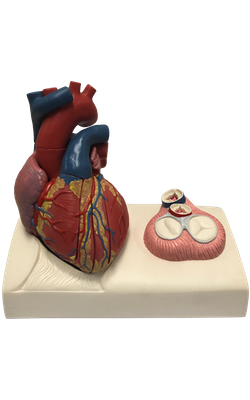Main Model

Coronary sinus

The heart is drained mainly
by veins that empty into the coronary sinus and partly by small veins that
empty into the right atrium. The coronary sinus, the main vein of the
heart, is a wide venous channel that runs from left to right in the posterior
part of the coronary sulcus. The coronary sinus receives the great cardiac vein
at its left end and the middle cardiac vein and small cardiac veins at its
right end. The left posterior ventricular vein and left marginal vein also open
into the coronary sinus.
The oblique vein of the left atrium (of Marshall) is a small vessel, relatively unimportant postnatally, that descends over the posterior wall of the left atrium and merges with the great cardiac vein to form the coronary sinus (defining the beginning of the sinus). The oblique vein is the remnant of the embryonic left superior vena cava, which usually atrophies during the fetal period, but occasionally persists in adults, replacing or augmenting the right superior vena cava.